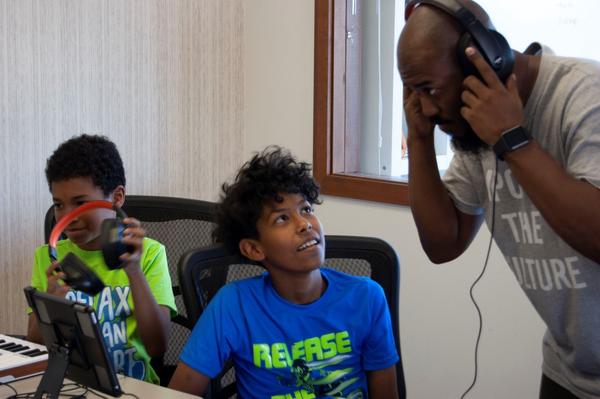The kids file out of the van and into WAPI Community Services’ Federal Way studio. They’ve just arrived from the Seola Gardens site of Neighborhood House, which, like WAPI, is a cohort member of the Best Starts for Kids Out-of-School Time initiative. They sit down in front of iPads, drum pads, and production-quality headphones that absolutely dwarf the middle schoolers, and are barely able to contain their excitement. They’ve here to learn hip hop music production, and within 15 minutes they’re engrossed in the creation of their songs. “Mr. Karrie, listen to this,” they excitedly shout, trying to get WAPI’s Prevention Coordinator and Lead Teaching Artist Karrie Williams to listen to their track. He puts on every pair of headphones that are handed to him, picking something out of everyone’s creation to comment on and affirm. One boy in the corner hardly looks up from his screen. He’s quickly layered effect after effect in his song and is testing out every single button available to him. When he lets me put on his headphones, he studies my reactions as he adds cymbals, synths, and horns.


Executive Director Aileen De Leon knows that this is the best part about their summer programming: “They’re doing something non-academic and fun! Pushing buttons is way more exciting than a notebook and a pen.” There are plenty of notebooks at WAPI, and academic learning is absolutely present, but it’s all about presentation. Their state-of-the-art equipment is not just about providing an industry-level experience to kids from low-income communities– it’s also about competing with the allure of substance use. “These kids pass so many dispensaries on the way over here. We have to give them something more exciting.” So the iPads may get them in the door, but it’s the relationships that keep them here.
Aileen is proud of the organization’s commitment to hiring from within the communities of color that they serve. “There’s always someone that looks like them. They are more engaged, more curious, and ultimately trust our teaching artists of color.” Though there is more time and energy during a school break, it’s also hard to do music education all day every day. There’s less variety of possible activities, limited space, and limited equipment, so WAPI works hard to ensure that they instill a passion for creativity in the kids that do come. “We want to show them that there are so many ways to be in the music industry, it’s not just rapping. What about production? What about management? What about marketing?”
They are more engaged, more curious, and ultimately trust our teaching artists of color.
AILEEN DE LEON, EXECUTIVE DIRECTOR
This summer’s successes are the result of a lot of intentional relationship building with Federal Way schools. WAPI expanded into the city with the support of BSK funds, and also expanded its program to serve middle schoolers for the first time. At the end of the 2018 school year, they were in partnership with 3 local schools, and this year they closed out with 6 partnerships. It’s because of these school-based relationships that WAPI’s Federal Way studio sees the traffic it does in the summer. They’ve been working within the schools to provide music production programming, as well as their substance use and mental health services.
WAPI’s Seattle BeatShop is also serving middle schoolers, which allows them to fine-tune the components of their program for this new age group. The content, delivery, even equipment needed to be reevaluated. Those iPads that kids from Neighborhood House are so eager to use are an example of the intentionality WAPI is putting into their new programs. The group of middle schoolers is totally in the zone, so clearly, WAPI is hitting its mark.
